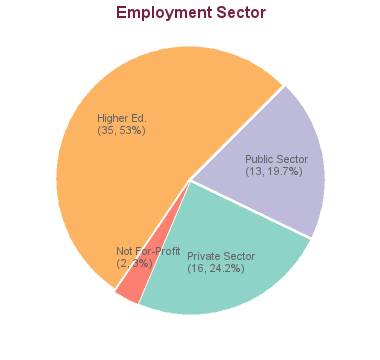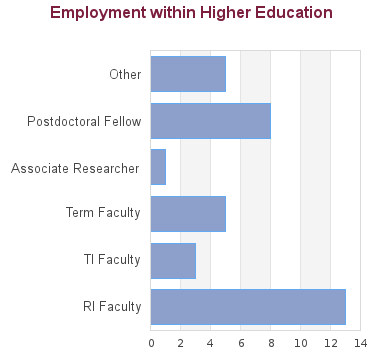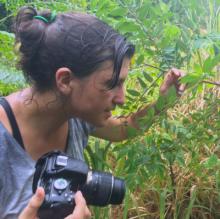Canadian Immigration Updates
Review details about the recently announced changes to study and work permits that apply to master’s and doctoral degree students. Read more
Overview
The Interdisciplinary Studies Graduate Program (ISGP) at the University of British Columbia was established in 1971, the first of its kind in Canada. It is one of the only Canadian programs to offer doctoral degrees in interdisciplinary studies, and is possibly one of the largest of its kind in North America.
The main purpose of the ISGP is to enable qualified graduate students to pursue advanced interdisciplinary research exceeding the provisions of existing departmental programs. There are no restrictions regarding the topic and in many cases the student draws upon expertise from several distinct faculties. The prospective student has to bring together three or four qualified faculty from different departments or units. Because there are no constraints on which fields are brought together, there are virtually no two students in the same sub-field. The ISGP is designed only for a highly motivated and superb student who can steer an independent course.
What makes the program unique?
ISGP gives you the opportunity to:
- pursue interdisciplinary research that is individually designed by the student
- select courses and research supervisors from every department at UBC
- participate in interdisciplinary lectures, workshops and seminars
- apply for funding for exceptional students
Quick Facts
Program Enquiries
Contact the program
Admission Information & Requirements
Program Instructions
Please see ISGP website for complete list of required documents.
1) Check Eligibility
Minimum Academic Requirements
The Faculty of Graduate and Postdoctoral Studies establishes the minimum admission requirements common to all applicants, usually a minimum overall average in the B+ range (76% at UBC). The graduate program that you are applying to may have additional requirements. Please review the specific requirements for applicants with credentials from institutions in:
Each program may set higher academic minimum requirements. Please review the program website carefully to understand the program requirements. Meeting the minimum requirements does not guarantee admission as it is a competitive process.
English Language Test
Applicants from a university outside Canada in which English is not the primary language of instruction must provide results of an English language proficiency examination as part of their application. Tests must have been taken within the last 24 months at the time of submission of your application.
Minimum requirements for the two most common English language proficiency tests to apply to this program are listed below:
TOEFL: Test of English as a Foreign Language - internet-based
Overall score requirement: 90
Reading
22
Writing
21
Speaking
21
Listening
22
IELTS: International English Language Testing System
Overall score requirement: 6.5
Reading
6.0
Writing
6.0
Speaking
6.0
Listening
6.0
Other Test Scores
Some programs require additional test scores such as the Graduate Record Examination (GRE) or the Graduate Management Test (GMAT). The requirements for this program are:
The GRE is not required.
Prior degree, course and other requirements
Document Requirements
Please see ISGP website for complete list of required documents.
2) Meet Deadlines
September 2025 Intake
Application Open Date
01 September 2024Canadian Applicants
International Applicants
3) Prepare Application
Transcripts
All applicants have to submit transcripts from all past post-secondary study. Document submission requirements depend on whether your institution of study is within Canada or outside of Canada.
Letters of Reference
A minimum of three references are required for application to graduate programs at UBC. References should be requested from individuals who are prepared to provide a report on your academic ability and qualifications.
Statement of Interest
Many programs require a statement of interest, sometimes called a "statement of intent", "description of research interests" or something similar.
Supervision
Students in research-based programs usually require a faculty member to function as their thesis supervisor. Please follow the instructions provided by each program whether applicants should contact faculty members.
Instructions regarding thesis supervisor contact for Doctor of Philosophy in Interdisciplinary Studies (PhD)
IMPORTANT: In order to ensure stability and appropriate level of support from your supervisory team, it is crucial that at least one of your proposed co-supervisors is a G+PS member who is tenured or tenure track faculty member holding the rank of Assistant/Associate/Full Professor (verify by entering name here).
Citizenship Verification
Permanent Residents of Canada must provide a clear photocopy of both sides of the Permanent Resident card.
4) Apply Online
All applicants must complete an online application form and pay the application fee to be considered for admission to UBC.
Tuition & Financial Support
Tuition
| Fees | Canadian Citizen / Permanent Resident / Refugee / Diplomat | International |
|---|---|---|
| Application Fee | $116.25 | $168.25 |
| Tuition * | ||
| Installments per year | 3 | 3 |
| Tuition per installment | $1,838.57 | $3,230.06 |
| Tuition per year (plus annual increase, usually 2%-5%) | $5,515.71 | $9,690.18 |
| Int. Tuition Award (ITA) per year (if eligible) | $3,200.00 (-) | |
| Other Fees and Costs | ||
| Student Fees (yearly) | $1,116.60 (approx.) | |
| Costs of living | Estimate your costs of living with our interactive tool in order to start developing a financial plan for your graduate studies. | |
All fees for the year are subject to adjustment and UBC reserves the right to change any fees without notice at any time, including tuition and student fees. Tuition fees are reviewed annually by the UBC Board of Governors. In recent years, tuition increases have been 2% for continuing domestic students and between 2% and 5% for continuing international students. New students may see higher increases in tuition. Admitted students who defer their admission are subject to the potentially higher tuition fees for incoming students effective at the later program start date. In case of a discrepancy between this webpage and the UBC Calendar, the UBC Calendar entry will be held to be correct.
Financial Support
Applicants to UBC have access to a variety of funding options, including merit-based (i.e. based on your academic performance) and need-based (i.e. based on your financial situation) opportunities.
Program Funding Packages
All full-time students in UBC-Vancouver PhD programs will be provided with a funding package of at least $24,000 for each of the first four years of their PhD from September 2024. The funding package may consist of any combination of internal or external awards, teaching-related work, research assistantships, and graduate academic assistantships. Please note that many graduate programs provide funding packages that are substantially greater than $24,000 per year. Please check with your prospective graduate program for specific details of the funding provided to its PhD students.
Average Funding
- 6 students received Teaching Assistantships. Average TA funding based on 6 students was $9,532.
- 13 students received Research Assistantships. Average RA funding based on 13 students was $20,892.
- 8 students received Academic Assistantships. Average AA funding based on 8 students was $7,509.
- 44 students received internal awards. Average internal award funding based on 44 students was $12,361.
- 14 students received external awards. Average external award funding based on 14 students was $24,258.
Review methodology
Scholarships & awards (merit-based funding)
All applicants are encouraged to review the awards listing to identify potential opportunities to fund their graduate education. The database lists merit-based scholarships and awards and allows for filtering by various criteria, such as domestic vs. international or degree level.
Graduate Research Assistantships (GRA)
Many professors are able to provide Research Assistantships (GRA) from their research grants to support full-time graduate students studying under their supervision. The duties constitute part of the student's graduate degree requirements. A Graduate Research Assistantship is considered a form of fellowship for a period of graduate study and is therefore not covered by a collective agreement. Stipends vary widely, and are dependent on the field of study and the type of research grant from which the assistantship is being funded.
Graduate Teaching Assistantships (GTA)
Graduate programs may have Teaching Assistantships available for registered full-time graduate students. Full teaching assistantships involve 12 hours work per week in preparation, lecturing, or laboratory instruction although many graduate programs offer partial TA appointments at less than 12 hours per week. Teaching assistantship rates are set by collective bargaining between the University and the Teaching Assistants' Union.
Graduate Academic Assistantships (GAA)
Academic Assistantships are employment opportunities to perform work that is relevant to the university or to an individual faculty member, but not to support the student’s graduate research and thesis. Wages are considered regular earnings and when paid monthly, include vacation pay.
Financial aid (need-based funding)
Canadian and US applicants may qualify for governmental loans to finance their studies. Please review eligibility and types of loans.
All students may be able to access private sector or bank loans.
Foreign government scholarships
Many foreign governments provide support to their citizens in pursuing education abroad. International applicants should check the various governmental resources in their home country, such as the Department of Education, for available scholarships.
Working while studying
The possibility to pursue work to supplement income may depend on the demands the program has on students. It should be carefully weighed if work leads to prolonged program durations or whether work placements can be meaningfully embedded into a program.
International students enrolled as full-time students with a valid study permit can work on campus for unlimited hours and work off-campus for no more than 20 hours a week.
A good starting point to explore student jobs is the UBC Work Learn program or a Co-Op placement.
Tax credits and RRSP withdrawals
Students with taxable income in Canada may be able to claim federal or provincial tax credits.
Canadian residents with RRSP accounts may be able to use the Lifelong Learning Plan (LLP) which allows students to withdraw amounts from their registered retirement savings plan (RRSPs) to finance full-time training or education for themselves or their partner.
Please review Filing taxes in Canada on the student services website for more information.
Cost Estimator
Applicants have access to the cost estimator to develop a financial plan that takes into account various income sources and expenses.
Career Outcomes
72 students graduated between 2005 and 2013. Of these, career information was obtained for 66 alumni (based on research conducted between Feb-May 2016):


RI (Research-Intensive) Faculty: typically tenure-track faculty positions (equivalent of the North American Assistant Professor, Associate Professor, and Professor positions) in PhD-granting institutions
TI (Teaching-Intensive) Faculty: typically full-time faculty positions in colleges or in institutions not granting PhDs, and teaching faculty at PhD-granting institutions
Term Faculty: faculty in term appointments (e.g. sessional lecturers, visiting assistant professors, etc.)
Sample Employers in Higher Education
University of British Columbia (11)Simon Fraser University (7)
Western University (Ontario)
Capilano University
Ryerson University
Swinburne University of Technology
University of Alberta
Providence University College
Stanford University
Dalhousie University
Sample Employers Outside Higher Education
Vancouver Coastal Health (2)BC Centre for Excellence in HIV/AIDS
Child Health BC
St. Michael's Hospital
TandemLaunch
BC Centre for Improved Cardiovascular Health
Nigel Haggan & Associates
Government of Canada
RCMP
The White Mountain School
Sample Job Titles Outside Higher Education
Consultant (5)International Chief Evaluator, President
General Partner
Developmental Consultant
Psychiatrist
Veterinarian, Animal welfare advocate
Project Manager
Postdoctoral Research Fellow
Teacher
Scientist
PhD Career Outcome Survey
You may view the full report on career outcomes of UBC PhD graduates on outcomes.grad.ubc.ca.Disclaimer
These data represent historical employment information and do not guarantee future employment prospects for graduates of this program. They are for informational purposes only. Data were collected through either alumni surveys or internet research.Enrolment, Duration & Other Stats
These statistics show data for the Doctor of Philosophy in Interdisciplinary Studies (PhD). Data are separated for each degree program combination. You may view data for other degree options in the respective program profile.
ENROLMENT DATA
| 2023 | 2022 | 2021 | 2020 | 2019 | |
|---|---|---|---|---|---|
| Applications | 25 | 24 | 30 | 22 | 36 |
| Offers | 13 | 9 | 9 | 12 | 14 |
| New Registrations | 12 | 8 | 9 | 11 | 11 |
| Total Enrolment | 73 | 75 | 83 | 77 | 87 |
Completion Rates & Times
Disclaimer
Upcoming Doctoral Exams
Monday, 9 December 2024 - 9:00am
Research Supervisors
Supervision
Students in research-based programs usually require a faculty member to function as their thesis supervisor. Please follow the instructions provided by each program whether applicants should contact faculty members.
Instructions regarding thesis supervisor contact for Doctor of Philosophy in Interdisciplinary Studies (PhD)
IMPORTANT: In order to ensure stability and appropriate level of support from your supervisory team, it is crucial that at least one of your proposed co-supervisors is a G+PS member who is tenured or tenure track faculty member holding the rank of Assistant/Associate/Full Professor (verify by entering name here).
Advice and insights from UBC Faculty on reaching out to supervisors
These videos contain some general advice from faculty across UBC on finding and reaching out to a supervisor. They are not program specific.
Doctoral Citations
| Year | Citation |
|---|---|
| 2014 | Dr. Wu interviewed survivors of the 2008 Wenchuan earthquake in China. The research showed that the survivors' memories of home-making can contribute to the creation of a sense of home in their new communities. This suggests that urban designers should use the memories of survivors to enhance the quality of post-disaster reconstruction and recovery. |
| 2014 | Dr. Levine investigated the role of cognition and culture in sustainable development. He synthesized theory on human cognition from a diversity of disciplines into a single foundational model, and then combined this with innovative empirical methods to produce directly management-relevant insights into two UNESCO Biosphere Reserves. |
| 2014 | Dr. Hutchings used a critical heritage studies approach to evaluate archaeology/cultural resource management's response to coastal change. His B.C. case study demonstrated how archaeology facilitates the destruction of Indigenous landscapes. Archaeology is a technology of government that promotes the ideology of growth, development and progress. |
| 2014 | Dr. Caspar examined how access to information is embedded in the social organization of long-term care. She found that front-line care staff lack access to care-related information and must rely on each other to accomplish their work. Administrators can use these findings to improve both the quality of work life and care in long-term care facilities. |
| 2014 | Dr. Buchman explored how patients with chronic pain and addiction negotiate their complex therapeutic relationships with clinicians. His findings provide evidence for the importance of cultivating mutual trust and collaboration in treatment decision-making. |
| 2014 | Dr. Chalmers developed a theory of Ideologically challenging entertainment designed to mitigate "us vs. them" beliefs. Using this, she created and directed a theatrical production that confronted views of the Arab-Israeli Conflict. Audience responses revealed that entertainment can moderate the ideologies that lead to violent conflict and genocide. |
| 2014 | Dr. Preto conducted an ethical and legal analysis of Canada's approach to clinical trial oversight. She identified various shortcomings and examined the different implications these have across industry and academic trials. Findings will benefit policy makers working to improve clinical trial oversight, researchers and trial participants. |
| 2014 | Dr. Wierzbicki studied architectural elements that can respond to the changing needs of building occupants. These kinetic elements have the potential to improve a building's ecological and functional performance. Her approach to designing kinetic structures addresses the expectations of urbanized societies and the need for more efficient buildings. |
| 2013 | Dr. McNeil studied access to health and harm reduction services for people who inject drugs. He examined how social, structural, and environmental forces affect access to these services. His work highlights the need to scale up harm reduction interventions, and expand these into hospitals, to improve health equity for people who inject drugs. |
| 2013 | Dr. Fast conducted research with young people who were street-involved and using drugs in Greater Vancouver. Her work encouraged youth to create a series of photo essays, to explore their complex senses of place in the city, over time. The findings have implications for how we think about, and attempt to intervene in the lives of marginalized youth. |
Pages
Sample Thesis Submissions
Further Information
Specialization
Interdisciplinary Studies allows students to design their own graduate program by bringing together three or four qualified faculty from different departments or units. Because there are no constraints on which fields are brought together, there are virtually no two students in the same subfield.
Program Website
Faculty Overview
Academic Unit
Program Identifier
September 2025 Intake
Program Enquiries
Contact the program
Departments/Programs may update graduate degree program details through the Faculty & Staff portal. To update contact details for application inquiries, please use this form.

Curious about life in Vancouver?
Find out how Vancouver enhances your graduate student experience—from the beautiful mountains and city landscapes, to the arts and culture scene, we have it all. Study-life balance at its best!




